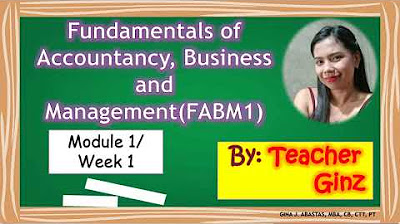Lesson 003 - Introduction to Accounting
Summary
TLDRThis introductory accounting lesson defines the field as a service activity providing financial information to aid economic decision-making. It highlights accounting's nature as an art, a process, and an information system, and its functions, including maintaining records, communicating financial results, meeting legal requirements, and assisting management. A brief history of accounting is also presented, tracing its roots to ancient civilizations and recognizing Luca Pacioli as the father of accounting for his work on the double-entry bookkeeping system.
Takeaways
- 📚 Accounting is defined as a service activity that provides quantitative, primarily financial information about economic entities to aid in economic decision-making.
- 🔢 The nature of accounting involves dealing with numbers, specifically financial data, which is essential for understanding a company's financial health.
- 📈 Accounting's function is not only to maintain systematic records but also to communicate financial results and serve as the language of business for stakeholders.
- 🏦 Accounting is applicable to various entities, including businesses and non-profit organizations, emphasizing its broad utility in record-keeping and financial management.
- 🤔 Accounting information helps business owners and managers make informed decisions and choose among alternative courses of action based on financial performance.
- 📉 The concept of revenues, expenses, and net income is fundamental in accounting, with the latter indicating profitability or loss.
- 👨🏫 Luca Pacioli is recognized as the father of accounting, having published a significant work detailing the double-entry bookkeeping system used widely to this day.
- 📖 The double-entry bookkeeping system is a method where every transaction affects two accounts, maintaining balance and accuracy in financial records.
- 🌐 Accounting has a rich history, dating back to ancient civilizations, showing its importance in trade and commerce over millennia.
- 🏛 Early examples of accounting practices can be found in civilizations such as Mesopotamia, Rome, and during the Goryeo dynasty in Korea, highlighting its universal need.
- 🛠️ Accounting serves multiple purposes, including meeting legal requirements, protecting business assets, and providing management with valuable operational insights.
Q & A
What is the definition of accounting according to the Accounting Standards Council?
-Accounting, as a service activity, its function is to provide quantitative information, primarily financial in nature about economic entities that is intended to be useful in making economic decisions and in making reasoned choices among alternative courses of action.
What are the two types of information mentioned in the script?
-The two types of information mentioned are qualitative and quantitative. Qualitative information does not involve numbers and describes or discusses something, while quantitative information involves numbers.
What is the role of revenues and expenses in accounting?
-Revenues are items that a company earns, indicating how much the company has made, while expenses are the amounts sacrificed by a company for business operations. In accounting, revenues are matched against expenses to determine net income or loss.
What is an income statement and what does it show?
-An income statement is a financial report showing revenues, expenses, and the net income of a company. It displays how much a company has earned and spent during a specific period, resulting in net income or loss.
How does accounting help in making economic decisions?
-Accounting provides quantitative financial information that allows business owners or managers to understand the financial health of the company. This information aids in making economic decisions, such as whether to expand, reduce costs, or change business strategies.
What is the significance of the double-entry bookkeeping system in accounting?
-The double-entry bookkeeping system is significant because it ensures that every business transaction affects two accounts, maintaining the balance of the general ledger. This system is foundational to accurate financial record-keeping and reporting.
Who is considered the father of accounting and what is his contribution?
-Luca Bartolomeo de Pacioli is considered the father of accounting. His contribution was the publication in 1494 of the book 'Summary of Arithmetic, Geometry, Proportions and Proportionality,' which included a chapter on the accounting methods used by Italian merchants, detailing the double-entry bookkeeping system.
Why is accounting referred to as an art?
-Accounting is referred to as an art because it is a designed process that involves following a set of rules and procedures to produce an output, such as financial reports. It requires skill, experience, and judgment, similar to other creative or artistic endeavors.
What are some of the functions of accounting beyond providing quantitative financial information?
-Beyond providing quantitative financial information, accounting functions include maintaining systematic records, communicating financial results, serving as the language of business for communication, meeting legal requirements, protecting business assets, and assisting management in decision-making.
How far back can the practice of accounting be traced, and where were some of the earliest records found?
-Accounting can be traced back to ancient civilizations, with evidence of record-keeping in Mesopotamia dating back more than 7,000 years. Early accounting records were also found in the ruins of Asian Babylon, Assyria, and Samaria.
Outlines

This section is available to paid users only. Please upgrade to access this part.
Upgrade NowMindmap

This section is available to paid users only. Please upgrade to access this part.
Upgrade NowKeywords

This section is available to paid users only. Please upgrade to access this part.
Upgrade NowHighlights

This section is available to paid users only. Please upgrade to access this part.
Upgrade NowTranscripts

This section is available to paid users only. Please upgrade to access this part.
Upgrade NowBrowse More Related Video

What is Accounting?

KONSEP BIAYA DAN AKUNTANSI BIAYA

FABM1 Week 1 Grade 11 Definition, Nature, History and Users of Accounting information

Materi Pembelajaran kelas 10 SMK || Akuntansi Dasar || Pengertian Akuntansi, Sejarah Akuntansi

Lesson 005 - Users of Accounting Information

Konsep Dasar Akuntansi dan Lingkungannya
5.0 / 5 (0 votes)